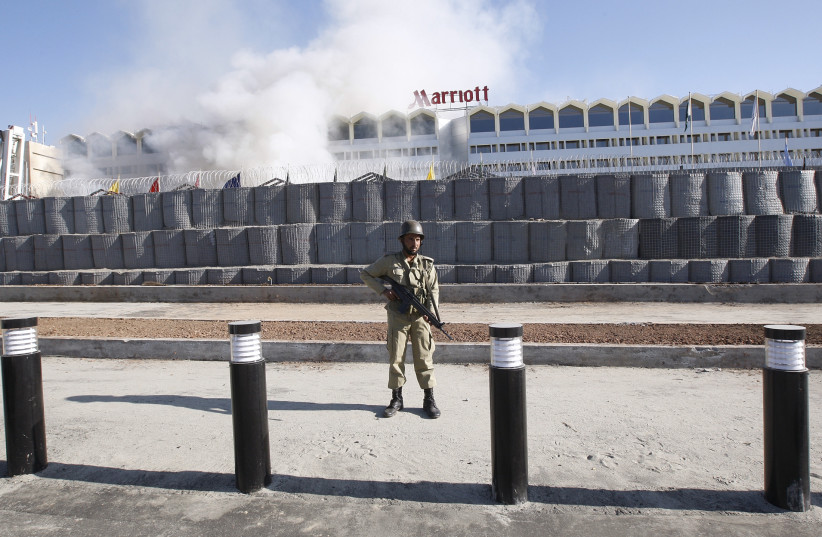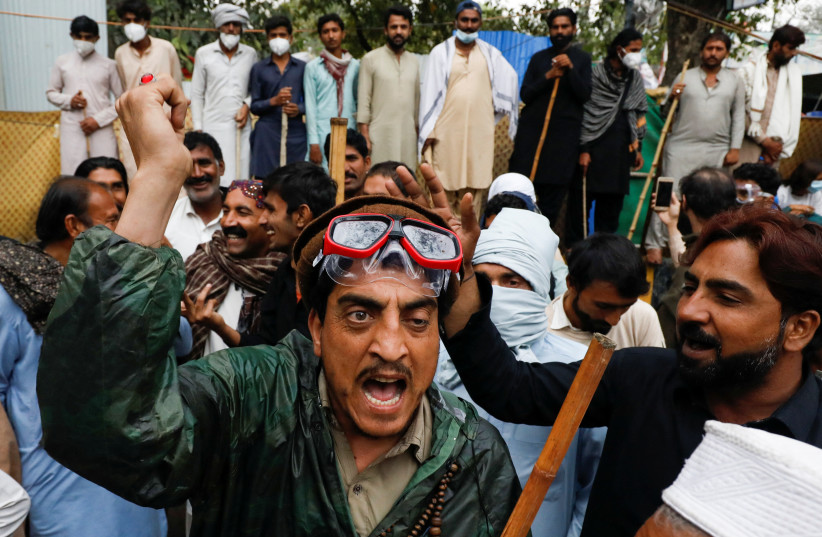[Islamabad] Following the arrest of a top terrorist commander, Pakistan’s National Security Committee has announced a plan to launch an “all-out comprehensive” operation to eliminate the threat of terrorism in the country.
For more stories from The Media Line go to themedialine.org
“The operation will be launched with the support of the nation and the government, with renewed resolve and determination to get rid of the menace of terrorism,” according to a statement from the Prime Minister’s Office. The statement also noted that a high-level committee had been convened that would recommend how to move forward with the operation.
The plan was announced at the National Security Committee’s meeting in Islamabad on Friday, which was chaired by Prime Minister Shehbaz Sharif.
Pakistan’s overall security situation was discussed in detail at the meeting. Attendees included the foreign affairs minister, interior minister, finance minister, and information minister, as well as provincial chief ministers, the chair of the Joint Chiefs of Staff Committee, the service chiefs of the army, navy, and air force, and the director general of Inter-Services Intelligence.
The National Security Committee meeting
The National Security Committee meeting was held after the Inter-Services Intelligence’s announcement of the arrest of terrorist commander Gulzar Imam, also known as Shambay. Imam was the founder and commander of the Baloch Nationalist Army (BNA), a separatist group that has claimed responsibility for multiple acts of terrorism.

Imam is believed to have been arrested in September 2022, but his arrest was unconfirmed until Friday.
The Pakistan Armed Forces in a statement described Imam as “a hardcore militant” and “a staunch believer in [an] independent Balochistan,” and noted that the BNA “is responsible for several terrorist attacks in Pakistan, including attacks on law enforcement facilities in Balochistan.”
The Baloch people are an ethnic group from South Asia and Southwest Asia. About half of the world’s 10 million Baloch people live in the southwestern province of Balochistan, which is Pakistan’s largest province by area. Baloch ethno-nationalist groups have been fighting since at least 2004 to establish a homeland for the Baloch people in a territory currently located across Pakistan, Iran, and Afghanistan.
Before founding the BNA, Imam served as deputy to Brahamdagh Bugti, who commanded the Baloch Republican Army, another separatist group.
Throughout the 2010s, various Baloch nationalist groups were created or merged with one another, including the Baloch Raaji Ajoi Sangar (BRAS), which was formed in 2018 as a coalition of the Baloch Liberation Army, the Balochistan Liberation Front, and the Baloch Republican Guard. During this period, leadership over the groups also shifted from tribal elders to commoners.
In addition to commanding the BNA, Imam was also the operational head of BRAS.
“The arrest of Imam is a result of a classic intelligence operation. Imam was identified after penetration into various social media groups and access to various terrorist networks,” a senior counterintelligence official told The Media Line on condition of anonymity.
The official described a complex operation planned over the course of months in which “characters were created, fake documents were prepared, and funds were delivered, keeping the target engaged and strengthening the relationship.”
Balochistan has been a site of conflict for several decades.
The province is rich in natural gas – the biggest contributor to the local economy – in addition to oil, copper, and gold. It borders the Punjab, Sindh, and Khyber Pakhtunkhwa provinces as well as Afghanistan and Iran.
Balochistan is also at the center of the $62 billion China-Pakistan Economic Corridor (CPEC) project, part of Beijing’s massive Belt and Road Initiative to develop routes of transportation throughout Central Asia.
A central aspect of the CPEC project in Balochistan is the development of a deep-water port at Gwadar, which will be linked to China’s Xinjiang Province. Other CPEC programs aim to develop the region’s energy infrastructure, transportation infrastructure, and industry.
Baloch nationalists initially wanted a share of the provincial resources, but have since been fighting to achieve independence.
Experts are divided as to the impact that Imam’s arrest will have on the Baloch separatist movement.
“This is a major blow to the BNA and other terror groups as well,” according to Waleed Parwez, a director at the Pakistan Strategic Forum, an Islamabad-based think tank focused on defense and security. “Indications are coming out among the terror outfits that Imam’s arrest has caused some internal rifts as well, as they blame each other for aiding the capture by providing information.”
According to Faran Jeffery, COO of the UK-based Midstone Centre for International Affairs, Imam’s capture will most likely not have a large effect on the Baloch nationalist movement overall.
Although “Imam’s arrest is a big setback for BNA itself, and I doubt that the group would be able to recover from it, it won’t have a significant impact on the overall Baloch separatist militancy in Pakistan,” Jeffrey said. “Depending on the information that Imam provides to the security agencies, the rest will join another group if raids are conducted or people are killed. Alternatively, another commander from their ranks could be selected.”
Kamal Alam, a nonresident senior fellow at the Atlantic Council’s South Asia Center, told The Media Line that the current Baloch nationalist movement must be understood within its historical and geopolitical context.
Alam called Imam’s arrest “a huge setback to BNA.” He noted, though, that “this war has ebbed and flowed since 1947. After peaking in the 70s and then again in the early 2000s, it has once again increased in its ferocity over the last few years.”
The Baloch nationalist movement is thought to be funded or otherwise supported by India and Afghanistan, which further complicates the position of the movement, Alam said. “There is also an undeclared intelligence war against the Iranians, simultaneous to the declared one against the Indians. Kabul also refuses to cooperate with Pakistan,” he said.

Alam described the current Baloch insurgency as “a mix of regional proxy wars, instability brewing from Afghanistan, and domestic problems in Iran with the protests” regarding the law mandating women to wear hijab.
Adeeb Ul Zaman Safvi, a Karachi-based defense and security analyst, told The Media Line that the delayed announcement of Imam’s arrest was done for political reasons.
“The arrest was made a few months ago, but has been made public now to divert attention from ongoing political mayhem and constitutional crises,” Savfi said.
Pakistan is facing political turbulence relating in large part to former Prime Minister Imran Khan. Khan, who was removed from office last year following a vote of no confidence, has called for snap elections that he insists will return him to power. Pakistan’s government and military establishment are at odds regarding whether to postpone the elections and whether to disqualify Khan, who is facing arrest for failure to appear at a corruption hearing.
“Until Islamabad has a stable government, it will be very difficult to control the ongoing insurgency. Unfortunately, without realizing the gravity of the situation, the present coalition regime is fighting the battle for its survival, duly supported by the powerful establishment,” Savfi said.
